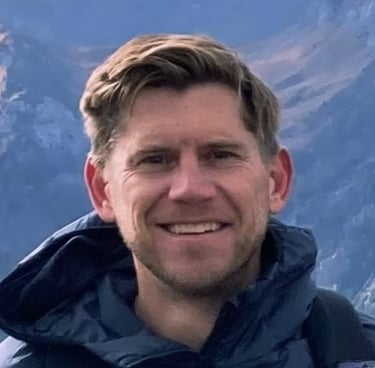41. The Life-Ruining Power of Routines
In this episode, we discuss the dark side of habits and creating joy in life. We are joined by Markham Heid, a freelance journalist who regularly writes for TIME and New York Times.


We chat about the following:
Routine vs living fully
Automating mundane tasks
Are you busy because it’s necessary?
How can companies get involved in breaking routine and encouraging creativity?
References
Article - The life-ruining power of routines
Biography
Markham has worked as a staff writer at both a major metropolitan newspaper and a national magazine, but for the past 12 years he’s worked as an independent (freelance) journalist.
Markham has written about England's Jurassic Coast for Travel & Leisure, covered workplace culture for an HR quarterly mag, and explored Germany's transition away from nuclear energy for Vox. But most of his writing has been in the health and science space.
Between 2014 and 2018, he wrote a weekly health column for TIME.com, which was called You Asked. Since 2018, Markham has done something similar for Medium, where he’s followed by ~350k subscribers. He’s still a frequent contributor at TIME, and he also writes regularly for the New York Times. His work has received awards from both the Society of Professional Journalists and the Maryland, Delaware, and D.C. Press Association.
He’s originally from Detroit, but right now he lives in southeast Germany with his wife and two kids.
Summary
The negative impact of routines and habits on personal optimization. 0:05
Bethany aims to increase income by securing one more board seat.
Markham Hyde argues in Financial Times article that routines lead to suffering, not personal optimization.
Routines, productivity, and spontaneity in adulthood. 3:15
Brandon: Routine-oriented, wants to package boring tasks for productivity.
Bethany: Automate, eliminate tasks to free mental load, not create routine.
Bethany and Brandon have different approaches to exercise and structure in their lives.
Brandon has lived in different countries and jobs, categorizing his life by chunks of time, while now as an adult with a family, he questions whether that's possible anymore.
Routine, spontaneity, and finding balance in life and work. 8:21
Bethany suggests finding balance between structure and unstructured time to pursue interests and passions.
Moderation is key to happiness, rather than being too rigid or spontaneous.
Bethany suggests creating a routine to overcome fear and find inspiration (0:11:02)
Bethany and Brandon discuss the balance between routine and spontaneity in business contexts (0:12:41)
Innovation weeks in companies, with a focus on structure and culture. 14:04
Innovation week at a company led to employee-generated ideas like preserving endangered languages using machine learning.
Bethany and Brandon discuss the success of innovation weeks at a previous company, with Bethany expressing interest in replicating the concept at her current company.
Finding balance between routine and novelty for productivity and mental well-being. 17:31
Markham recognizes the limitations of routines and habits, advocating for balance in life.
Bethany appreciates Markham's contrarian perspective on habits, finding common ground in the need for balance.
Markham: Habits can limit creativity, need variety to open up new perspectives.
Markham: Balancing routine and novelty depends on individual comfort levels and life stage.
Finding balance between routine and novelty in life. 22:41
Markham: Happiness is a byproduct of engagement, not the goal of life.
Bethany: Routine gives us a sense of control, but can lead to compulsive habits.
Markham shares his thoughts on how to avoid boredom and stay engaged, including trying new things and mixing up his work routine.
Markham has taken steps to address boredom by meeting with friends, working in different locations, and incorporating creative activities into his day.
The importance of questioning routines and habits for fulfillment. 26:39
Bethany values fun and exploration, leaving her previous career for a year of discovery.
Markham highlights the importance of mindfulness in identifying what brings joy and fulfillment.
Bethany: Questioned life after realizing habits were controlling it.
Markham: Brain's engagement with new experiences creates fulfilling time.
Brandon: Outsourcing routine tasks to free up time for high-value activities.
Markham: Filling extra time with productive or healthy habits, rather than exploring new things.
Work-life balance, prioritizing memories, and finding meaningful experiences. 32:51
Bethany and Markham discuss the concept of "time travel" and how our lives are a series of experiences that we may not remember in the long term.
They reflect on the importance of figuring out what choices to make in life to lead to a happy and fulfilling existence.
Organizations prioritize work over personal growth, leading to employee dissatisfaction.
Markham suggests taking breaks to give brains time to put pieces together (0:37:38)
Markham advises focusing on what matters, bringing forward what led to joy and satisfaction (0:38:07)
